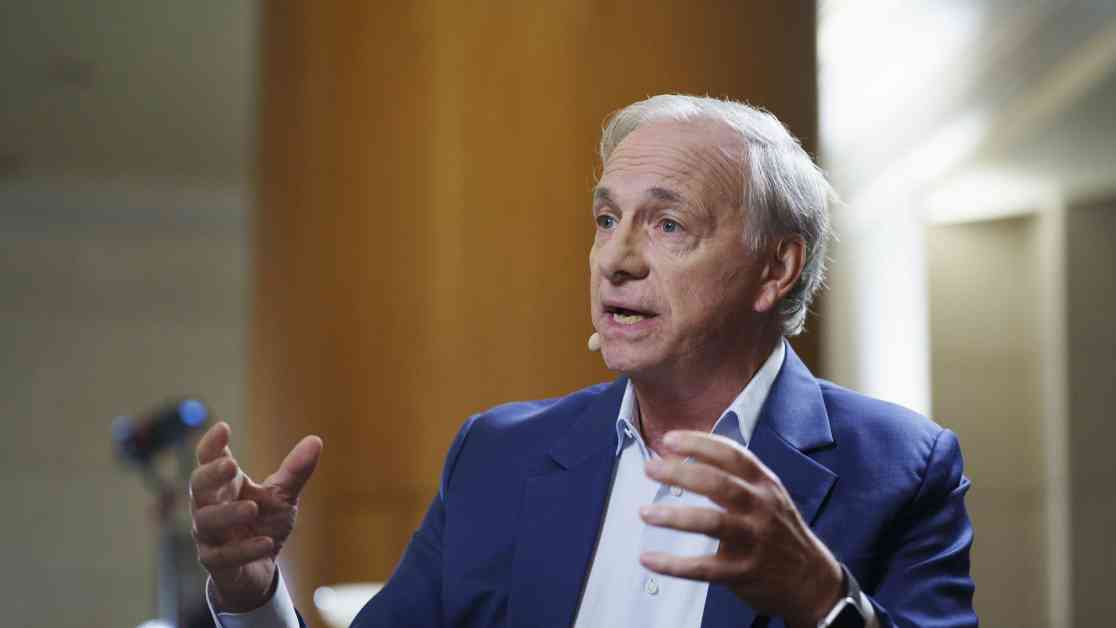U.S. billionaire Ray Dalio, the founder of Bridgewater Associates LP, recently shared his insights on the top five forces shaping the global economy during an interview at the Milken Institute’s Asia Summit in Singapore. Dalio highlighted that these five factors are interconnected and often cyclical in nature, emphasizing the need to understand their impact on the world economy.
Debt, Money, and the Economic Cycle
One of the primary concerns raised by Dalio is the management of debt and its implications on the economic cycle. With the uncertainty surrounding the U.S. Federal Reserve’s interest rate decision, Dalio questioned how the country’s escalating debt will be addressed. The U.S. central bank has maintained benchmark rates at their highest level in over two decades, leading to a substantial increase in debt service costs. The allocation of $1.049 trillion for debt service represents a 30% surge compared to the previous year, with a total payment estimate of $1.158 trillion for the current year. Dalio emphasized the importance of understanding the value of debt and its impact on wealth distribution and economic stability.
Internal Order and Disorder
Another critical factor highlighted by Dalio is the state of internal order and disorder within a country, particularly in the context of U.S. politics leading up to the election. He pointed out the deep-rooted divides between the right and left ideologies, exacerbated by significant wealth and value gaps. The question of a peaceful transition of power has been brought into doubt, with political tensions running high. The upcoming election cycle has seen Vice President Kamala Harris emerging as a frontrunner in the polls, surpassing former President Donald Trump. Despite the political landscape, Dalio noted that the president’s policy agenda has limited influence on the overall health of the U.S. economy.
Great Power Conflicts
Geopolitical tensions, particularly between the U.S. and China, have been a cause for concern according to Dalio. The ongoing disputes over territorial claims, political status, and trade tariffs have strained the relationship between the two global powers. Dalio highlighted the fear of potential conflict between the U.S. and China, emphasizing the need to avoid scenarios of mutual destruction. While he refrained from mentioning specific triggers, he emphasized the disorder that could arise from a breakdown in relations between the two nations.
Acts of Nature
Dalio also drew attention to the impact of “acts of nature” on global stability, noting that natural disasters and pandemics have historically posed significant threats to societies. The increasing frequency and intensity of climate-related events have raised concerns about their economic and social repercussions. According to the World Economic Forum, the climate crisis could result in a 12% loss in global GDP for every 1°C rise in temperature. Dalio stressed the need for proactive measures to address climate change and mitigate its adverse effects on the economy and society.
Technology
In contrast to the potential risks posed by other forces, Dalio expressed optimism about the transformative power of technology. He highlighted the immense productivity gains that technology can offer if harnessed effectively. Dalio pointed out the emergence of unicorn companies driven by technological innovation, noting the positive impact on a segment of the population. He also emphasized the strategic importance of technological superiority in military conflicts, suggesting that the nation with superior technological capabilities would have an advantage in warfare.
In Conclusion
As Dalio assessed the five forces shaping the global economy, he underscored the need to anticipate potential downside risks and uncertainties. By understanding the interconnected nature of these factors, policymakers and business leaders can better navigate the complex dynamics of the world economy. Balancing the challenges posed by debt, internal divisions, geopolitical tensions, natural disasters, and technological advancements will require a comprehensive and strategic approach to ensure sustainable economic growth and stability in the future.
















